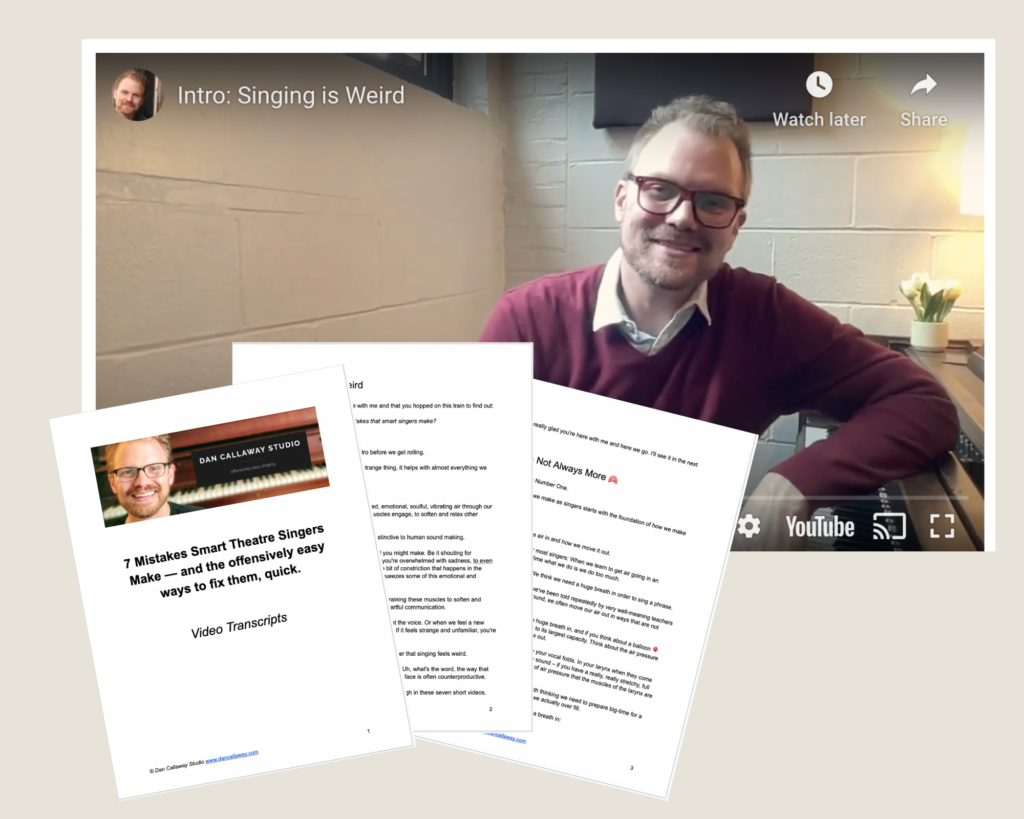I’m going to tell you some of the ways I shenanigized and monkeyed around during my tenure with The Phantom of the Opera Music Box Company.
It all started my first night on at the Fabulous Fox in St. Louis.
I’d layered on all my costumes, shown old Raoul the music box in the auction, and entered successfully into the opera rehearsal scene as the Lion Man.

Then the ballet drop fell. Ballerinas screamed and spun, and Meg sang, “He’s here! The Phaaantom of the Operaaaa!”
?”He is with us, it’s the ghost!” we echoed.
A member of the ensemble crossed directly to me just as her blocking dictated, reached out, and whispered, “Who you gonna call?”
Not seven minutes into my phirst Phantom, I had to turn upstage.
Then there was the issue of the gun.
I played the guy in the orchestra pit who shoots at (and misses) the Phantom in Act 2.
The stage manager showed me how to cock and shoot the gun in rehearsals. I grew up around guns being the country boy I was, and the method for this old prop wasn’t intuitive, but I did my best. (I was also a rule follower and a good grade getter.)
My first week on was not a success.
Five shows went by when I couldn’t fire the gun. Poor Raoul had to change lines.
There was even a matinee when I managed to drop both blanks ONTO the floor of the orchestra pit.
CLINK. CLINK.
In the middle of the only talky scene.
Glen the conductor hated that gun (and me that week).
Charlene the stage manager offered me a bottle of Veuve Clicquot if I could get through a whole week of successful cock-n-fires.
She also called me Stinky because the gun smelled of sulphur.
Finally, I just asked the prop master Dean who handed me the gun every night to show me how he’d do it.
He was a Carolina boy like me. He grabbed the handle, pulled back the hammer with his thumb, released it and handed it back.
My redneck instincts: validated.
I never missed a shot after that. (Except the matinee in Peoria when I made a premature costume change and missed my entrance for the other gun-fire scene. Sorry again, Raoul.)
Other naughties included but weren’t limited to:
A fellow fop in the opera scene assigning me characters for every show. I clandestinely peppered in John Wayne, Tarzan, and Stevie Wonder into my interpretations.
This practice ended when one of my choices made them laugh too much to sing their first line, and we narrowly avoided the stage manager’s ire.
I was also introduced to three games by a particularly seasoned ensemble member:
Anticipation; Delayed Reaction; and Spin like a Ballerina When You’re Scared.
You can do the math on the outcomes of this Meisner/Stanislavsky hybrid work.
Truth is this: Being a committed and excellent ensemble member is hard.
And when I got up to shenanigans, it diminished the show for the audience and for me.
Sure, I look back on some of that, and it’s funny. I laugh.
But a lot of it? Yeah, I don’t feel proud and satisfied.
This is the thing that’s hard to remember as a member of a long-running show:
Just because it’s old news to you doesn’t mean it’s not mind-blowing to someone else.
That ringing 8-part harmony may be played out for you, but it could be the most beautiful thing the high school kid who plopped down his savings from double shifts at Panera ever heard.
The place where we get tripped up is this —
We think we have to re-create that experience of offer ourselves every time when we deliver these familiar songs, lessons, or lines.
We don’t.
We just have to remember that for the one we’re communicating with, this could be life-changing.
The other takeaway from my failings in professionalism:
If it’s worth saying, it’s worth repeating.
If you’re writing something, teaching something, singing something — if it’s good and worthy, it’s worth repeating.
I’ll guarantee you everybody wasn’t listening first time.
In fact, you probably weren’t, either.
I can’t tell you how many times I will teach a song in lessons, and I’ll say, “Hey wait a minute!” after years of hearing a certain lyric. This happens all the time.
The repeated and the ordinary things in life hold treasures.
So, I want to encourage you to walk a familiar path today and look with new eyeballs.
Take a sec to smell your coffee. If your body feels ok when you get out of bed, take a moment to think what a miracle it is to have a working body.
And if you’re singing a song in your audition book that feels tired to you but always works, take some time to re-listen. You may hear a lyric for the very first time.
A good question that helps me:
What’s the most satisfying way I can work on this?
That’s what I hope for you — that your work will be satisfying and fill you up like a delicious plate of creamy risotto.
You’re worth that satisfaction.
And always remember, there’s only one you, and folks need to hear the story only you can sing.
Love much,
Dan
PS The MFA Pedagogy Students and I went on a See-Your-Boston-With-New-Eyes scavenger hunt last week. (It was too beautiful to sit inside.)






PPS In case you missed it last week, remember I made this free video series for you:
7 Mistakes Smart Theatre Singers Make — and the Easy Ways to Fix Them
